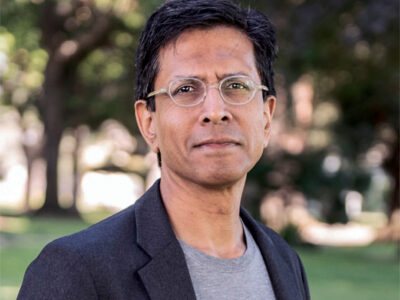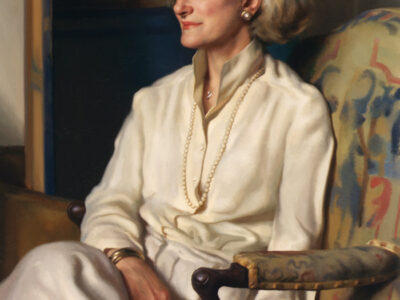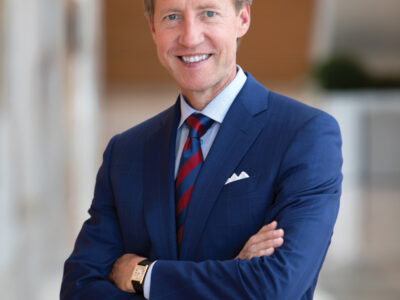After “serious reflection,” Dr. Stanley Chodorow, Penn’s provost for the past three and a half years, announced last month that he was resigning in the wake of becoming one of five finalists for the presidency of the University of Texas at Austin. He will remain in office until the end of this month. While his resignation as provost is official regardless of what happens, he will stay on as a professor of history at Penn if he is not chosen for the UT-Austin job or for the presidency of any other university where he has been a candidate.
“When it became public that I was on the list in Texas, I knew it was time,” explained Chodorow. “I think it is necessary and appropriate for me to step down as provost, so that President [Judith] Rodin can identify my successor to work with her on the ambitious goals of Agenda for Excellence that are already well underway, especially the 21st Century Project for the Undergraduate Experience.” Rodin is expected to name an acting provost and set up a search committee to find a permanent one before the end of the semester.
The Cornell-educated Chodorow, whose field of history is medieval law, was chosen by then-incoming President Rodin for the provost’s job in 1994. At the time he was serving as associate vice chancellor for academic planning and dean of arts and humanities at the University of California at San Diego. During his tenure as Penn’s chief academic officer, he has been responsible for getting the Perelman Quadrangle project up and running after plans for a student center on the current site of Sansom Common had foundered; co-authoring (with Rodin) the Six Academic Priorities part of the Agenda for Excellence; coordinating the swelling international program; and developing what he calls “a discourse and activities related to the electronic revolution.” His most important contribution, though, has probably been the multifaceted 21st Century Project, whose centerpiece is the new college-house plan (see last month’s “Gazetteer” and this month’s “Notes from the Undergrad” for more on that).
“In the last year or so he pulled together the University community to accomplish things we’ve been trying to do for decades — the student center and the implementation of a comprehensive residential plan,” said Dr. David Brownlee, professor of art history, who chaired the Residential Communities Working Team. “He deserves credit for what will be seen as the most important [elements] for improving undergraduate education in the last decade or two.” Brownlee praised Chodorow as both “extraordinarily effective” and refreshingly candid, adding that his candor was the “foundation for a relationship of trust” that he developed with those with whom he worked.
“He has been a very strong advocate for undergraduate education,” added Dr. Robert Rescorla, the professor of psychology and (until the end of the semester) associate dean for undergraduate education in the School of Arts and Sciences. “He really worked hard to foster undergraduate education across the various undergraduate schools. He was a pleasure to work with; he cared deeply about intellectual matters; and he understood what it was to be a scholar and a teacher.”
Although the relationship between the provost’s and president’s offices was reportedly somewhat strained over the last year or so, Rodin, CW’66, praised Chodorow when he announced his resignation, saying: “Stan and I have had three great years working together to advance Penn, and we have accomplished a great deal. There is much yet to be done, and we will miss him. Stan’s loyalty to Penn, and his great concern for its best interests, are exemplified in his decision today. He appreciates the importance of committed leadership in the Office of the Provost, something he has concluded, after a great deal of personal reflection, that he can no longer provide while he is a candidate for the presidency of another major American university.”
The Texas post actually represents the fifth presidency of a major university for which Chodorow has been interviewed in the last 14 months, though UT Austin is the first that publicly announced its candidates. As a result, there had been a perception by some that he was becoming a lame-duck provost. According to Dr. Vivian Seltzer, the professor of human development and behavior who serves as chair of the Faculty Senate, that perspective “was based merely on perceptions that he was clearly being interviewed for wonderful jobs, and at that point it was only a matter of time before he would either find a job or be selected … One likes to talk with someone who’s going to be around to implement the policy.”
In his first few months on campus, Chodorow incurred the wrath of The Daily Pennsylvanian by suggesting that students should not necessarily be involved in planning a new curriculum for Penn because they didn’t have the time and weren’t always “the best organized people in the world.” The DP never let him forget that off-the-cuff remark, though in a farewell editorial titled “In the image of Chodorow,” the current editorial regime allowed that he had learned from his early “blunders” and recommended that the University pick someone with “similar qualities” — someone who is “passionate about academics and also in touch with the students.”
“In a campus as complex and wonderful as ours,” said Seltzer, “it takes a while to understand the climate — and to know how to find your own way in the climate.
“He will be missed by many of us,” she added. “He has very creative ideas and is a sincere and sensitive soul who has added to the fabric of the University community.”
Stanley Chodorow Speaks Out
ON RESEARCH UNIVERSITIES AND THE IVY LEAGUE:
I think that 20 or 30 years from now, Penn’s relationship to the
rest of the Ivy League will be totally different. Not because it will
have “caught up” in the traditional sense; I don’t mean it being first
choice among students — I think it will be, in fact, but not because
it’s trying to become a better 18th-century college. In essence, Penn
never was an 18th-century college — it was an 18th-century university.
And the era of the university, and the era of the institution which
offers high-class, theoretically-based, knowledge-making, and
knowledge-using professional techniques in relation to everyone else is
the future. The next century is going to privilege institutions like
Penn, and I think that 20 or 30 years from now, Penn will be regarded as
one of the premier institutions of the country.
I think that the 21st Century Project has the potential of
constructing an undergraduate experience within a research university
that will make it plain to everyone, everywhere in this country, why a
student should come to a research university. It is a rich environment,
and the question is, how do undergraduates take advantage of that wealth
— that intellectual wealth, the fabric. And we’re showing the way. And
I think that when we have developed this and it is really fully mature,
it will really be a model institution.
ON THE SWEET SORROW OF PARTING:
Sure I have regrets. This is a wonderful place. It’s just cookin’! I mean, moving.
It’s terrific, and it’s getting better all the time. I have very great
respect for a lot of my colleagues. I will miss them. And I’ll miss the
students. Teaching these students here is terrific. [Shaking his head
and laughing] They’re just smart as hell. And I’ve had a good time with
them.




